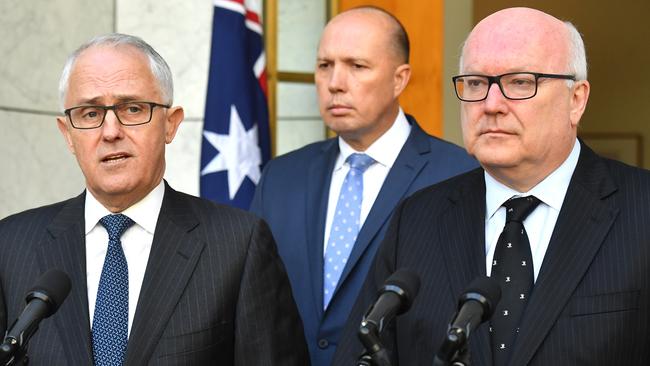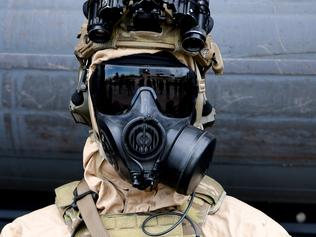Father slams Islamic State plotter son as a ‘stupid’ drug-taker
The Sydney man in an alleged plot to funnel money to Islamic State was an unemployed, drug-taking construction worker.

The Sydney terrorist at the centre of an alleged plot to funnel thousands of dollars to Islamic State, and who has exhorted Muslims to carry out attacks in Australia, was an unemployed, drug-taking construction worker labelled “stupid’’ by his father.
Ahmed Merhi has drawn the attention of police and intelligence agencies because of his connection to at least one terror plot, foiled by police a week ago. Merhi, who has used social media to encourage Australian Muslims to attack their own communities, was allegedly the source for thousands of dollars that police claim had been transferred by a 16-year-old schoolgirl and 20-year-old extremist Milad Atai, who were both arrested a week ago.
Police allege the girl, who cannot be named, was used by Merhi and Atai to facilitate the transfer of $5000 to Islamic State.
Atai and the girl are in jail after having been refused bail.
Merhi, originally from Sydney’s west, has been likened by police to Neil Prakash and Mohamed al-Baryalei, two Islamic State extremists who manipulated a network of Australian-based supporters to plan attacks and recruit to Islamic State.
A senior counter-terrorism source said Merhi had been in contact with a handful of known extremists in Australia whose activities were being monitored by authorities.
“One of the concerns is that he might (also) have influence with some of the people we don’t know about,’’ the source said.
Merhi arrived in Syria in 2014 and since then has, particularly in the past year, exhorted his supporters in Sydney and elsewhere to engage in violent jihad.
He is a popular figure among Islamic State sympathisers in Sydney, remaining in contact with people targeted in the Appleby counter-terror investigation that has seen 14 people arrested since it began 18 months ago.
An examination of Merhi’s past reveals the former Sydney labourer traded a life of drugs, petty crime and unemployment for the cult of militant Islam.
His father, Faraj Merhi, said his son was wild, headstrong and frequently in trouble with the law before leaving Australia for the Syrian battlefield. “He was going the wrong way when he was here, too,’’ Mr Merhi told The Australian. “He was on drugs or something ... We tried to help him a lot. Always, he do his own mind. He’s got his own way.’’
Mr Merhi said his family was essentially unreligious. While his wife, who is Lebanese, prays, Mr Merhi says he forswore religion after migrating to Australia from his home in Syria, where he still has family. “I hate religions since the time they create Israel,’’ he said. “That’s when they start, when I was young. That’s when they start, religious hatred.’’
He said his son worked intermittently as a labourer, at one point flying in and out of Perth for work. He was often in trouble with police, although he appears not to have done jail time.
Mr Merhi said his son was “wild, he was stupid. One time he got arrested for drugs, but little drugs. He didn’t go to jail for it … Another time assault or something, I don’t know what it is.’’
Before leaving for Syria, Ahmed Merhi’s faith deepened, a common story among Islamic State’s band of foreign fighters, many of whom have violent or criminal pasts. In 2014, Merhi told his family he planned to do the Haj, the pilgrimage to Mecca required of all pious Muslims. “I was surprised,’’ his father said. “But what can I do? He’s not young, he can go.’’
Merhi became one of a small number of Australian extremists who used the cover of Haj as a way of giving authorities the slip and departing for Syria, where he joined Islamic State.
The Australian has tracked Merhi’s communications on Twitter and Facebook since June, when his posts were more about his love of religion than of violence and jihad. As he descended further into Islamic State’s ideology, the posts became more concerning.
His guns — AK-47s, an American-made M16, various pistols — began to show up in other photos.
His father said when he first heard from his son in Syria, he begged him to come home.
“First, when he got there, I tell him to come back, come back, come back. That’s wrong … (but) he said no, he never come back ... he doesn’t tell me much,’’ he said.


